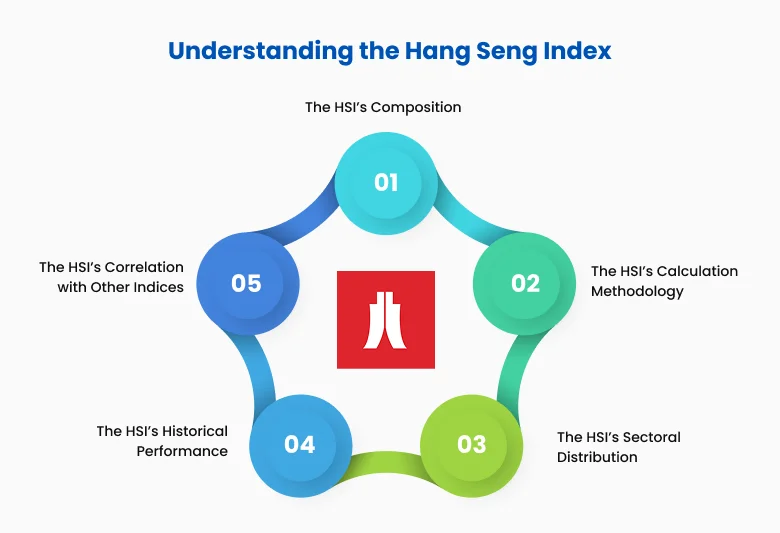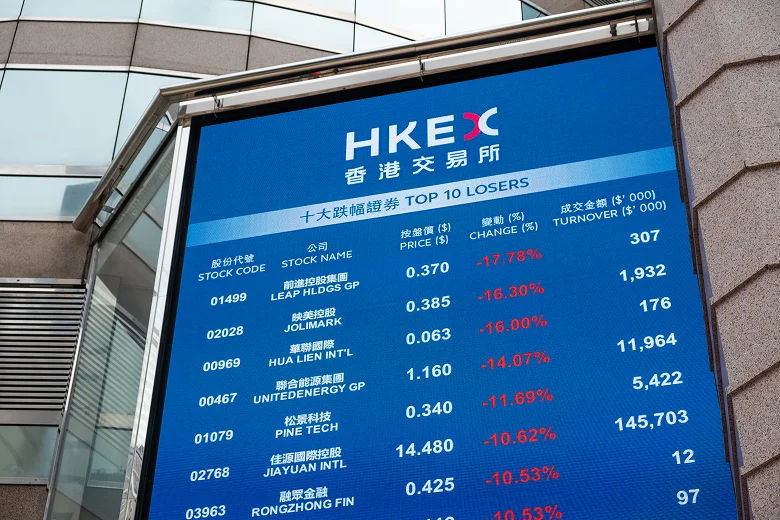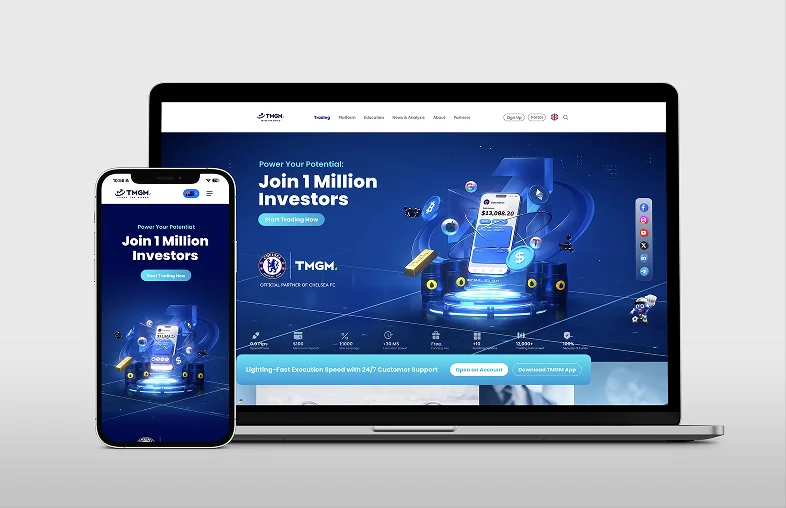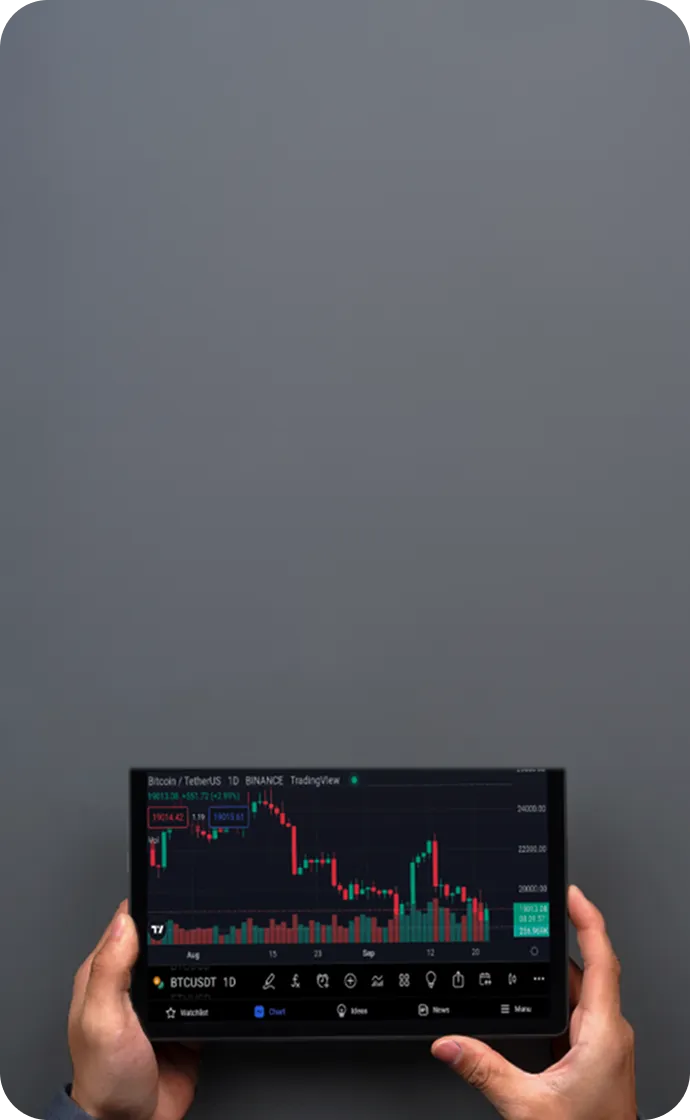What is the Hang Seng Index?
Launched in 1969, the Hang Seng Index (HSI) is a free-float-adjusted, market capitalization-weighted benchmark that tracks the performance of the top 50 companies listed on the Hong Kong Stock Exchange (HKEX). It serves as a key barometer of Hong Kong’s overall market health and is closely monitored by investors globally.

HSI Composition
The index comprises leading firms across multiple sectors:
Financials: Major banks, insurers, and financial services companies (e.g., HSBC Holdings, AIA Group).
Information Technology: Technology leaders and internet enterprises (e.g., Tencent Holdings, Alibaba Group).
Real Estate: Property developers and real estate management firms (e.g., Sun Hung Kai Properties).
Consumer Goods and Services: Retailers, food and beverage companies (e.g., Budweiser Brewing Company APAC).
Utilities and Energy: Providers of electricity, gas, and oil (e.g., CLP Holdings).
The HSI undergoes regular reviews and rebalancing to reflect market developments and maintain its representation of Hong Kong’s economy.

Why Trade the Hang Seng Index?
#1 Access to Asian Markets
Economic Gateway: Hong Kong serves as a strategic gateway connecting Western investors to China'’s rapidly expanding economy.
Growth Opportunities: Exposure to fast-growing sectors such as technology and consumer services across Asia.
#2 High Volatility Creates Trading Opportunities
Price Sensitivity: The HSI reacts strongly to global and regional developments, offering frequent entry points for traders.
Active Market: Suitable for day traders and swing traders targeting short-term profits.
#3 Diversification Benefits
Sectoral Diversification: Broad industry exposure reduces concentration risk associated with single stocks.
Geographical Diversification: Balances portfolios heavily concentrated in Western markets.
#4 Liquidity and Market Access
High Trading Volume: Enables swift position entry and exit.
Global Availability: Accessible through international brokers and electronic trading platforms.
#5 Hedging Opportunities
Risk Management: Hedge exposure in other asset classes or markets by taking positions in the HSI.
Currency Stability: Benefit from the Hong Kong dollar’s peg to the US dollar, mitigating currency risk.
How to Trade the Hang Seng Index
#1 Contracts for Difference (CFDs)
Trading Flexibility: Trade on margin, enabling larger exposure with a smaller capital outlay.
Leverage: Amplify potential gains and losses through leveraged positions.
Directional Trading: Profit from both bullish and bearish market moves by going long or short.
#2 Futures Contracts
Standardized Contracts: Traded on regulated exchanges with fixed contract sizes and expiry dates.
Margin Requirements: Generally require higher initial margin compared to CFDs.
Liquidity: High liquidity during HKEX trading hours.
#3 Options Contracts
Strategic Flexibility: Employ strategies such as spreads, straddles, and hedging techniques.
Defined Risk: Maximum loss limited to the premium paid when purchasing options.
Complexity: Requires knowledge of options pricing models and Greeks (delta, gamma, theta, vega).
#4 Exchange-Traded Funds (ETFs)
Convenience: Trade like stocks during market hours.
Diversification: Gain exposure to all index constituents in a single transaction.
Cost Efficiency: Typically lower management fees compared to mutual funds.
#5 Mutual Funds and Index Funds
Professional Management: Managed by fund professionals who handle asset allocation and rebalancing.
Minimum Investment: Often require higher initial capital than ETFs.
Fees: Management and performance fees may affect net returns.
#6 Direct Equity Trading
Selective Exposure: Invest directly in individual HSI constituent stocks that fit your investment strategy.
Higher Risk and Reward: Potential for greater returns and increased volatility compared to index trading.
Research Intensive: Requires thorough fundamental analysis of company financials and market position.
Key Trading Strategies
Technical Analysis
Trend Identification: Use moving averages and trend lines to spot upward, downward, or sideways market trends.
Support and Resistance: Identify critical price levels where the index may reverse or consolidate.
Chart Patterns: Recognize formations such as flags, pennants, and wedges indicating potential breakouts or reversals.
Indicators:
MACD (Moving Average Convergence Divergence): Assists in determining trend direction and momentum.
Stochastic Oscillator: Signals overbought or oversold market conditions.
Average True Range (ATR): Measures market volatility.
Fundamental Analysis
Economic Data Monitoring:
Hong Kong Economic Indicators: Inflation rates, employment statistics, retail sales data.
China’s Economic Data: Due to close economic ties, China’s GDP growth, manufacturing output, and policy shifts are critical.
Monetary Policy:
Interest Rate Decisions: Actions by the Hong Kong Monetary Authority influence liquidity conditions.
Currency Stability: The HKD-USD peg impacts foreign capital flows.
Corporate Earnings:
Earnings Seasons: Quarterly earnings reports can drive significant index volatility.
Analyst Forecasts: Consensus estimates and revisions influence market sentiment.
News and Sentiment Analysis
Geopolitical Events:
US-China Trade Relations: Tariffs, trade negotiations, and diplomatic developments affect market dynamics.
Local Political Environment: Regulatory changes and political stability in Hong Kong impact investor confidence.
Global Economic Trends:
Commodity Prices: Influence energy and materials sector companies.
Global Interest Rates: Changes in major economies affect capital flows into the HSI.
Investor Sentiment:
Market Surveys: Track bullish or bearish trends among institutional investors.
Social Media and News Feeds: Monitor public sentiment and potential market-moving rumors.
Risk Management
Set Risk Tolerance: Define your maximum acceptable loss per trade or portfolio-wide.
Use Stop-Loss Orders: Automate trade exits to limit losses in volatile conditions.
Diversify Positions: Allocate capital across various instruments or sectors to reduce risk.
Regular Portfolio Review: Adjust holdings in response to market changes and performance.
Psychological Discipline
Emotional Control: Avoid trading decisions driven by fear or greed.
Adhere to Your Plan: Follow your predefined trading strategy and rules consistently.
Learn from Experience: Analyze losing trades to refine your approach.
Continuous Education: Stay informed on market trends and enhance your trading skills.
Optimal Trading Times for the Hang Seng Index
Trading Sessions
Hong Kong Market Hours:
Morning Session: 9:30 AM to 12:00 PM HKT
Afternoon Session: 1:00 PM to 4:00 PM HKT
Extended Hours: Some brokers provide pre-market and after-hours trading, though liquidity may be reduced.
Volatility Peaks
Market Open and Close: Heightened activity and volatility typically occur during the first and last trading hours.
Economic Releases: Scheduled data announcements can trigger sharp price movements.
Overlap with Other Markets: Concurrent trading hours with European markets may influence volume and volatility.
Time Zone Considerations
Global Traders: Align your trading schedule with Hong Kong market hours for optimal execution.
News Timing: Major global news events may impact the HSI outside regular trading hours.
Steps to Begin Trading the HSI
#1 Select a Regulated Broker
Regulatory Compliance: Choose brokers licensed by reputable financial authorities.
Product Range: Access to HSI CFDs, futures, options, and ETFs.
Trading Platform: User-friendly platforms equipped with advanced charting and real-time data.
Customer Service: Responsive support available when needed.
#2 Open and Fund Your Trading Account
Account Setup: Submit required identification and verification documents.
Deposit Funds: Use secure payment methods and meet minimum deposit thresholds.
#3 Practice with a Demo Account
Simulated Trading: Gain familiarity with the platform and test strategies risk-free.
Realistic Market Conditions: Trade using live market data to replicate actual trading scenarios.
#4 Develop a Trading Plan
Define Objectives: Set clear trading goals and timeframes.
Select Strategies: Choose between technical, fundamental, or hybrid approaches.
Establish Risk Controls: Determine stop-loss and take-profit parameters.
#5 Execute Trades
Market Orders: Immediate execution at prevailing market prices.
Limit Orders: Execution at a specified price or better.
Position Monitoring: Track open positions and adjust as market conditions evolve.
#6 Review and Optimize
Performance Evaluation: Regularly analyze trading outcomes.
Strategy Adjustment: Refine methods based on performance insights.
Stay Updated: Monitor market news and economic developments.

Trading the Hang Seng Index with TMGM
TMGM provides a powerful platform for trading the Hang Seng Index and other global financial products.
Advantages of Trading HSI with TMGM
Advanced Platforms: Access MetaTrader 4 and MetaTrader 5 with comprehensive analytical tools.
Competitive Pricing: Tight spreads and low commissions to maximize profitability.
Flexible Leverage: Adjustable leverage options tailored to your risk tolerance.
Educational Support: Webinars, tutorials, and market insights to enhance your trading skills.
Dedicated Customer Service: Multilingual support available 24/5.
Tips for Successful HSI Trading
Maintain Discipline: Follow your trading plan consistently.
Control Emotions: Avoid impulsive trades driven by market volatility.
Continuous Learning: Keep updating your knowledge of markets and trading techniques.
Engage with the Trading Community: Participate in forums and groups to exchange insights.
Utilize Trading Tools: Employ indicators, signals, and expert advisors to support decision-making.
Trading the Hang Seng Index offers rewarding opportunities for traders who invest time in understanding market dynamics and crafting effective strategies. The HSI provides a comprehensive view of Hong Kong and China’s economic landscape, presenting diverse avenues for profit.
By emphasizing thorough analysis, disciplined risk management, and ongoing education, you can successfully navigate the complexities of the HSI market.
Partnering with a trusted broker like TMGM enhances your trading experience by providing essential tools, resources, and support.










